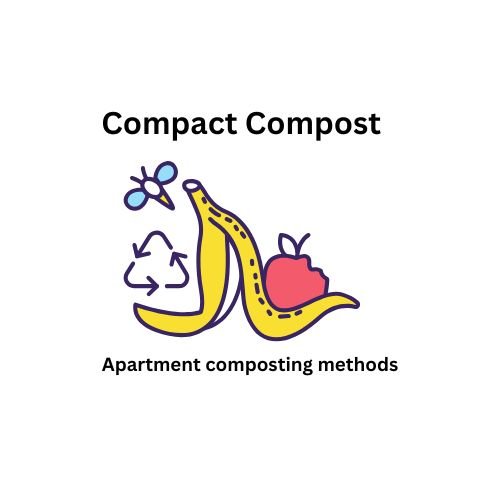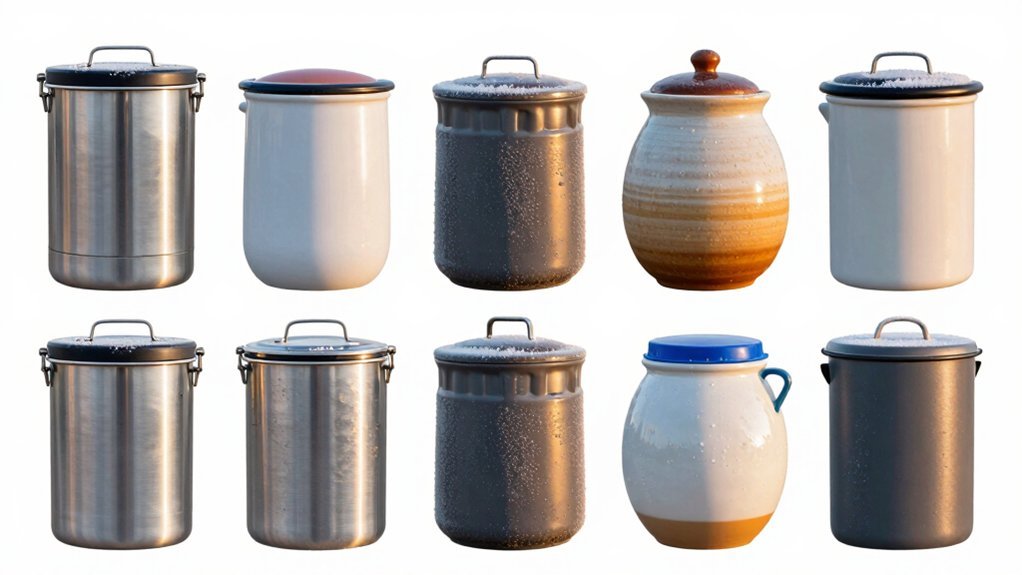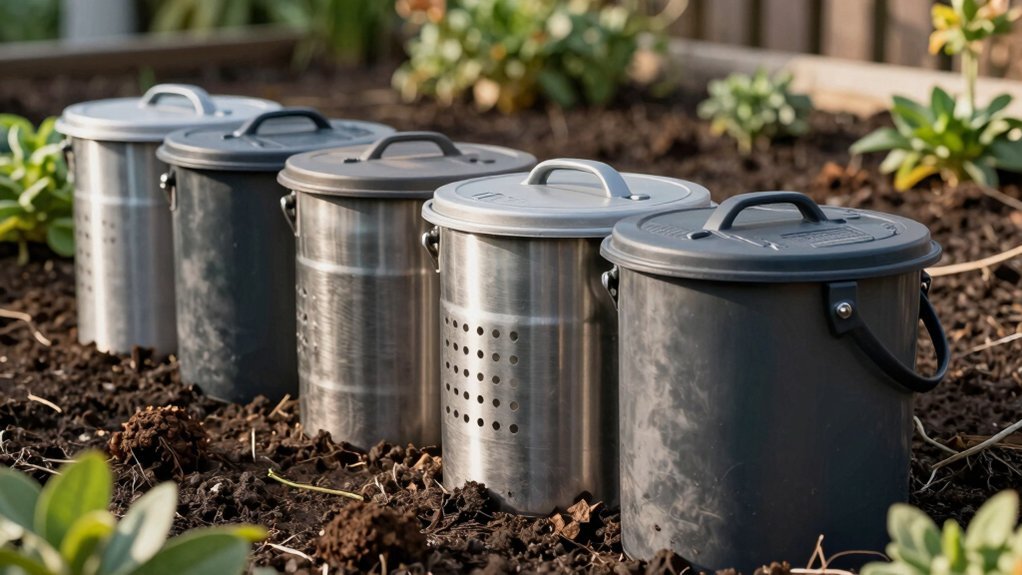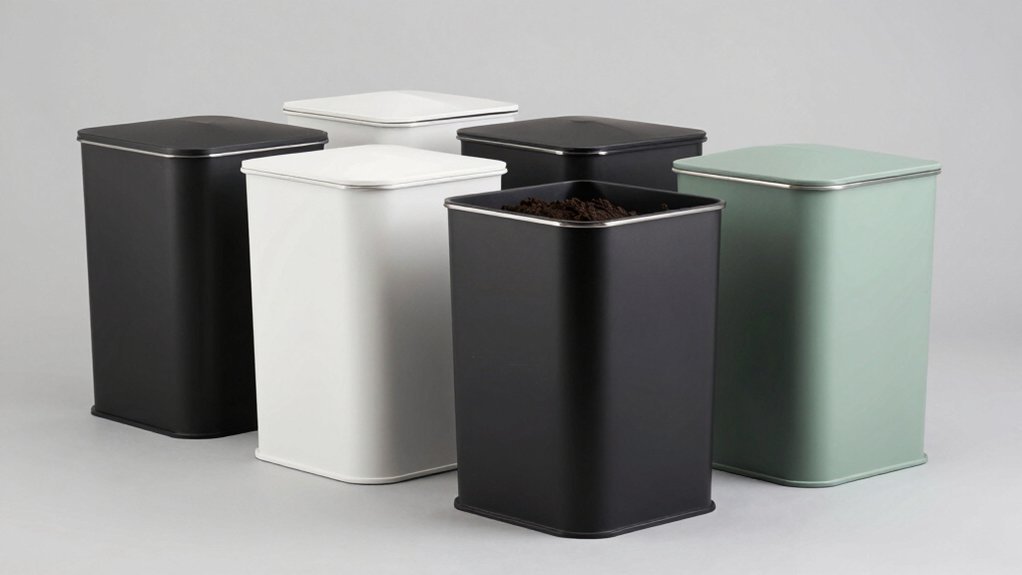You'll find that maintaining the right temperature in your compost pile can make or break your decomposition success. Whether you're a seasoned gardener or just starting your composting journey, having the proper tools to monitor and regulate heat levels will transform your organic waste into black gold. From basic thermometers to advanced electronic systems, the latest temperature regulation products can help you achieve that perfect 130-150°F sweet spot for ideal breakdown.
16 Inch Compost Thermometer with Temperature Guide
For serious composters seeking precision monitoring, the 16-inch stainless steel compost thermometer offers an extensive solution with its color-coded dial and deep-reaching stem. You'll get quick readings within 30 seconds, displayed in 2°F increments across a 40-180°F range.
The thermometer's design features a hermetically sealed gauge that won't fog up and a 3/16-inch thick stem that reaches deep into your pile. While it's marketed as heavy-duty, you'll need to handle it with care, as some users report breakage issues. Despite occasional accuracy concerns, the color-coded zones help you easily track when your compost is steady, active, or hot.
Best For: Gardeners and composting enthusiasts who need to monitor compost pile temperatures accurately and want an easy-to-read, full-length thermometer for deeper piles.
Pros:
- Long 16-inch stem reaches deep into compost piles for accurate core temperature readings
- Color-coded dial provides quick visual feedback on compost activity levels
- Hermetically sealed design prevents internal fogging and moisture buildup
Cons:
- Durability issues reported with stem breakage despite heavy-duty claims
- Some users report inconsistent temperature readings compared to other thermometers
- Actual stem diameter (3/16 inch) is smaller than advertised (1/4 inch)
Utopia Kitchen Countertop Compost Bin (1.3 Gallon)
Kitchen composting becomes effortless with the Utopia Kitchen Countertop Compost Bin, making it an ideal choice for eco-conscious families who want to reduce their carbon footprint while maintaining a stylish kitchen aesthetic.
This 1.3-gallon stainless steel bin won't scratch, crack, or chip, and it's equipped with charcoal filters to control odors naturally. You'll appreciate its secure lid that opens with one hand, preventing unwanted smells and pests. It's dishwasher safe and easy to clean with warm, soapy water.
For best results, place a paper towel at the bottom to absorb moisture. You can use it with or without compostable bags, and its generous capacity lets you collect scraps for days.
Best For: Environmentally conscious households looking for a durable, odor-free solution to collect kitchen scraps while maintaining a sleek kitchen appearance.
Pros:
- Effective odor control system with replaceable charcoal filters
- Durable stainless steel construction that resists scratches and damage
- Large 1.3-gallon capacity while maintaining a compact countertop footprint
Cons:
- Requires regular filter replacement for optimal odor control
- Initial cost higher than plastic alternatives
- May need frequent emptying in larger households with heavy food waste
Long Stem Compost Soil Thermometer for Garden Monitoring
Dedicated gardeners and composting enthusiasts will find the Long Stem Compost Soil Thermometer an essential tool for precise temperature monitoring. The 16-inch stainless steel probe features a 1.9-inch dial displaying temperatures from 0°F to 180°F with color-coded zones for steady, active, and hot conditions.
You'll appreciate the water-resistant glass surface and 304-grade rust-resistant construction that guarantees durability in outdoor environments. The thermometer delivers readings within 30 seconds, helping you determine ideal planting times and composting activity. While some users note concerns about probe thickness, most report excellent accuracy and reliability, making it a valuable addition to your gardening toolkit.
Best For: Gardening enthusiasts and composters who need accurate temperature monitoring for their soil and compost piles, particularly those managing large or multiple compost systems.
Pros:
- Long 16-inch stainless steel probe allows deep temperature readings without disturbing compost pile
- Clear, color-coded dial with wide temperature range makes readings easy to interpret
- Water-resistant and rust-resistant construction ensures durability in outdoor conditions
Cons:
- 30-second reading time may be longer than some users prefer
- Some users report concerns about probe thickness and potential fragility
- Glass lens may occasionally fog up in certain weather conditions
Espoma Organic Compost Starter (4 lb)
Experienced gardeners seeking an all-natural composting accelerator will find the Espoma Organic Compost Starter a reliable choice. This USA-made powder blend supercharges your compost pile's decomposition process while maintaining organic standards.
You'll need just one cup of the starter per 16 cubic feet of organic material. Simply add it to your compost pile or tumbler when introducing new materials. The 4-pound bag comes in a convenient size of 12.68 x 7.44 x 3.39 inches, making storage straightforward.
With a strong 4.4-star rating from users, this product's effectiveness has earned it recognition, though some gardeners debate whether it speeds up composting considerably compared to natural decomposition.
Best For: Eco-conscious gardeners and composters who want to accelerate their composting process using an all-natural product from a established American manufacturer.
Pros:
- All-natural ingredients with no synthetic chemicals
- Easy to use with simple measuring instructions
- Comes from a reputable company with nearly 100 years of experience
Cons:
- Mixed reviews on effectiveness compared to natural decomposition
- Relatively expensive for a composting aid
- Limited package size options available
Jora Composter JK 400 Dual Chamber Compost Tumbler
The Jora Composter JK 400 stands out as an ideal solution for households producing large volumes of food waste, with its impressive 106-gallon capacity processing up to 21 gallons weekly.
You'll appreciate its dual-chamber design, which lets you fill one side while compost matures in the other. The galvanized steel construction and insulation help maintain temperatures above 160°F, greatly speeding up decomposition. While assembly requires two people and can be challenging, the long-term benefits are worth it – users report up to 7 years of reliable performance with minimal maintenance. For best results, monitor your green-to-brown ratios and consider adding a compost accelerator to optimize breakdown.
Best For: Large households or community gardens needing an efficient, high-capacity composting solution for significant food waste volumes while wanting the convenience of continuous composting through dual chambers.
Pros:
- High-temperature composting (160°F+) accelerates decomposition process
- Durable galvanized steel construction with insulation for year-round use
- Dual chamber design allows simultaneous filling and compost maturation
Cons:
- Challenging assembly process requiring two people and specific tools
- Limited instructions provided; may need additional online guidance
- Some users report issues with panel alignment and proper sealing
Smart Electric Countertop Composter (3.8L)
Modern homeowners seeking an efficient waste management solution will find the Smart Electric Countertop Composter (3.8L) invaluable for their kitchen. The unit transforms food scraps into natural fertilizer in just 4-6 hours, achieving a 90% waste reduction through its high-temperature process.
You'll appreciate its user-friendly features, including one-touch operation, LED display guidance, and an auto-clean function. The composter's activated carbon filter guarantees odor-free operation, while its quiet performance (<45dB) won't disturb your household. Its compact 3.8L design fits perfectly on countertops or under sinks, making it ideal for daily use. The low-speed, high-torque blades can even handle chicken bones, offering versatile composting capabilities.
Best For: Environmentally conscious homeowners with limited outdoor space who want a convenient, indoor solution for converting kitchen waste into fertilizer.
Pros:
- Rapid composting process completes in just 4-6 hours
- Odorless operation with activated carbon filter makes it perfect for indoor use
- User-friendly features including one-touch operation and auto-cleaning function
Cons:
- Limited 3.8L capacity may require frequent emptying for larger households
- Initial investment cost may be higher compared to traditional composting methods
- Requires electricity for operation, increasing energy consumption
Compost Thermometer 39.4 Inch with Temperature Guide
Serious composters will appreciate this professional-grade thermometer's 39.4-inch stainless steel stem, which reaches deep into large compost piles for accurate temperature readings.
You'll get clear readings in both Fahrenheit (0°F to 220°F) and Celsius (-10°C to 100°C) within 30 seconds on the 2-inch dial. The waterproof design features a fog-free glass surface and reinforced welded bolts for durability in all conditions.
The included temperature guide helps you interpret readings and adjust your composting process. Whether you're monitoring hay bales or maintaining ideal decomposition temperatures, this 0.16-inch thick stainless steel thermometer delivers reliable performance that both beginners and experienced gardeners trust.
Best For: Serious gardeners and composting enthusiasts who need accurate temperature monitoring of large compost piles and want professional-grade durability and precision.
Pros:
- Extra-long 39.4-inch stem reaches deep into large compost piles for accurate readings
- Durable waterproof design with fog-free glass and reinforced construction for long-term reliability
- Quick 30-second temperature readings in both Fahrenheit and Celsius with included reference guide
Cons:
- May be unnecessarily long for smaller home composting bins
- Premium pricing compared to shorter, basic compost thermometers
- Metal stem could potentially rust over time despite stainless steel construction
Factors to Consider When Choosing Compost Temperature Regulation Products
When you're shopping for compost temperature regulation products, you'll need to focus on several critical features that guarantee accurate monitoring of your composting process. You should evaluate each product's measurement accuracy range, build quality, weather resistance, probe length for proper depth readings, and temperature response speed. These key factors will determine how effectively you can maintain ideal composting conditions and achieve successful decomposition.
Accuracy and Measurement Range
Selecting the right compost temperature regulation product requires careful attention to both accuracy and measurement range capabilities.
You'll want to choose a thermometer that provides readings in increments of 2°F or less to guarantee precise monitoring of your compost's conditions. Look for instruments that cover a thorough range from 0°F to 220°F (-10°C to 100°C), which will let you track temperatures from initial decomposition through peak heating phases above 160°F.
Quick reading times are essential – opt for devices that deliver results within 30 seconds so you can make timely adjustments to your compost pile. For added convenience, consider thermometers with color-coded dials, as they'll give you instant visual feedback about your compost's temperature status, making it easier to maintain ideal conditions throughout the decomposition process.
Material and Build Quality
Beyond precise measurements, the materials and construction of your compost thermometer will determine its long-term reliability. You'll want to look for stainless steel components that resist rust and corrosion, ensuring your tool withstands harsh outdoor conditions.
Pay attention to the stem thickness – a diameter of about 0.25 inches provides the strength you'll need when pushing through dense compost piles. Choose models with waterproof and fog-resistant features, including hermetically sealed components and reinforced glass surfaces. These design elements prevent moisture buildup and maintain clear readings.
Quality construction details matter too. Look for robust welded bolts and easy-to-read dials. These features aren't just about durability – they'll make your composting routine more efficient and help you maintain ideal decomposition temperatures with less hassle.
Durability in Harsh Weather
Harsh weather conditions can quickly deteriorate your compost temperature tools, making weather resistance a critical factor in your selection process. When choosing your equipment, look for products made with stainless steel components, as they'll resist rust and maintain their integrity through changing seasons.
You'll want to prioritize tools with sealed components to prevent moisture buildup and fogging, which can affect accuracy and longevity. Select models with thicker stems or poles, as they're less likely to bend or break during regular use in your compost pile. Always verify that your chosen product features a waterproof design to protect against rain damage and moisture exposure.
Before making your final decision, check user reviews focusing on long-term outdoor performance. This real-world feedback will help you identify products that consistently perform well in challenging weather conditions.
Monitoring Depth Capabilities
While weather resistance protects your equipment on the outside, proper monitoring depth guarantees you're getting accurate readings from deep within your compost pile. You'll want to choose a thermometer that can reach 12 to 16 inches deep, where most microbial activity occurs.
For larger compost operations, consider thermometers with extended stems up to 39.4 inches. These longer probes let you monitor temperatures throughout deeper piles without disrupting the decomposition process. Look for models with stems around 0.25 inches thick, as they'll provide more reliable readings by minimizing external temperature interference.
The best thermometers deliver readings within 30 seconds and feature color-coded dials to help you quickly assess your pile's condition. These visual indicators make it easy to determine if your compost is maintaining ideal temperature zones.
Temperature Response Time
When managing a compost pile effectively, you'll need a thermometer that delivers quick, accurate readings. Look for models that provide reliable measurements within 30 seconds, as this rapid response time enables you to make timely adjustments to your composting process.
You'll want to focus on thermometers featuring clear, easy-to-read dials with color-coded temperature ranges. These visual indicators help you quickly interpret the readings and assess your compost's heat status without delay. Fast-reading thermometers allow you to monitor temperature fluctuations in real-time, which is essential for maintaining ideal decomposition conditions.
Frequently Asked Questions
How Long Does It Take for Compost to Reach Optimal Temperature?
You'll see your compost reach ideal temperature (130-150°F) within 24-72 hours if you've properly balanced green and brown materials, maintained moisture, and guaranteed adequate pile size and aeration.
Can I Compost During Winter Months in Cold Climates?
Yes, you can compost during winter months in cold climates. You'll need to insulate your pile with straw or leaves, keep it larger (at least 4 cubic feet), and continue adding nitrogen-rich materials to maintain heat.
What Happens if My Compost Pile Becomes Too Hot?
If your compost pile gets too hot, it'll kill beneficial microorganisms and slow decomposition. You should turn the pile, add dry brown materials, and guarantee proper ventilation to bring temperatures back to ideal levels.
Should I Add Water When Compost Temperature Starts Dropping?
Yes, you'll want to add water when temperatures drop, as moisture helps microorganisms stay active. But don't overdo it – your compost should feel like a wrung-out sponge for ideal decomposition.
Do Different Types of Food Waste Affect Composting Temperatures Differently?
Yes, different food wastes create varying temperatures. High-nitrogen items like coffee grounds and fresh greens heat up quickly, while starchy foods and fruit scraps break down more slowly with lower temperature increases.





Leave a Reply